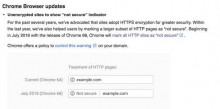A physical key is the secret to Google employees' online security
It turns out the key to counteracting employee phishing at Google is an actual key.
The company began using physical USB-based security keys in early 2017 and since then, none of its 85,000-plus employees have been phished on their work accounts, Krebs on Security reported last week. The keys serve as an alternative to two-factor authentication, in which users first log into a website using a password and then must enter an additional one-time code that's usually sent to their phone via text or an app.












































































